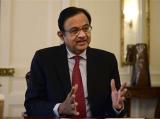He further said there was no need for panic over declining value of rupee and the domestic currency would regain the losses suffered in last few days and stabilise.
 "I am looking forward to more reforms... I expect a number of decision in the next few days and weeks... In June, you can expect number of decisions taken and implemented that will accelerate reforms and spur investments in critical sectors," Chidambaram said.
"I am looking forward to more reforms... I expect a number of decision in the next few days and weeks... In June, you can expect number of decisions taken and implemented that will accelerate reforms and spur investments in critical sectors," Chidambaram said.
He said the decision will be taken on coal and gas pricing, coal allocation to power plants, FDI limit in various sectors, including defence, and skill development.
Chidambaram said the Sebi board will take a decision on K M Chandrasekhar committee report on rationalisation of foreign investment norms on June 25.
The Minister was addressing media in the backdrop of steep decline in rupee which on Tuesday touched life-time low of 58.96 intra-day against the US dollar.
Rupee, which touched 58.22 to a dollar in early trade, lost ground during the day, and is currently trading at 58.48 today.
"There is no reason for panic... Countries with large current account deficit have taken a hit on currencies. Rupee will find its level. We are concerned about volatility. Rupee will regain losses suffered in the last few days," he said.
Expressing satisfaction over declining gold imports, Chidambaram appealed to the people to "resist the temptation to buy gold" saying it will dramatically change the CAD position.
Chidambaram, however, ruled out any immediate hike in gold import duty saying he doesnt want to be "too unpopular".
Chidambaram said Prime Minister Manmohan Singh has called a meeting of the Finance Minister and other key advisers to discuss steps to revive investment and stalled projects.
The government should keep in mind the long-term interest while taking important decision relating to pricing of natural resources, he said.
Chidambaram said the steps taken by the government since August last year have yielded results and the fiscal deficit has come down to 4.9 per cent in 2012-13 and inflation has moderated.
The economic condition is stronger today than what it was in the same period last year, he said, adding that lot of people continue to keep faith in India growth.
The government, he said, will leave no stone unturned to achieve the revenue targets in the current financial year and hoped that fiscal deficit of 4.8 per cent is achievable. "If it is better, so be it," he added.
The stocks markets today tanked sharply and the BSE benchmark Sensex was trading down by 217 points to 18,824.86 in the afternoon trade.
Ruling out any expenditure compression in the current fiscal, the Minister said the Ministries have been asked to move ahead with their investment plans, which is necessary for improving investment sentiment and reviving growth.
"Revenue collections are satisfactory. I will achieve my revenue target. I will leave no stone unturned to achieve the revenue target," he said.
Replying to a question on whether government was contemplating a VDIS (Voluntary Disclosure of Investment Scheme) type amnesty scheme to bring out gold, the Minister said: "I have one wish if people of India can fulfil is that don't buy gold."
Chidambaram further said the real concern is the performance of the crude, natural gas and fertilisers sector as they have recorded negative growth in last three years.
"We need to get our act together. I am sure we can share some decisions in July," he said.
On the possibility of issuing NRI Bonds to raise overseas funds, the Minister said: "Can't answer question on which decision have not been taken. We are watching the situation. When we take a decision, we will share it with you".
Asked about disinvestment of Coal India, the Minister said the coal major was on the list of PSUs which have to be divested and the Ministry will try to impress upon the Trade Unions that funds raised would be used for capital expenditure of other state-owned companies.
"I have to put in Rs 15,000-20,000 crore annually for five years into PSU banks," he said.
On the impact of rupee depreciation on subsidies, Chidambaram said it will have a bearing on goods which are imported.
However, as far as the domestic prices of petroleum products are concerned, he said, the impact of rupee decline could be neutralised by a decline in value of crude oil in international markets.






Comments
Add new comment